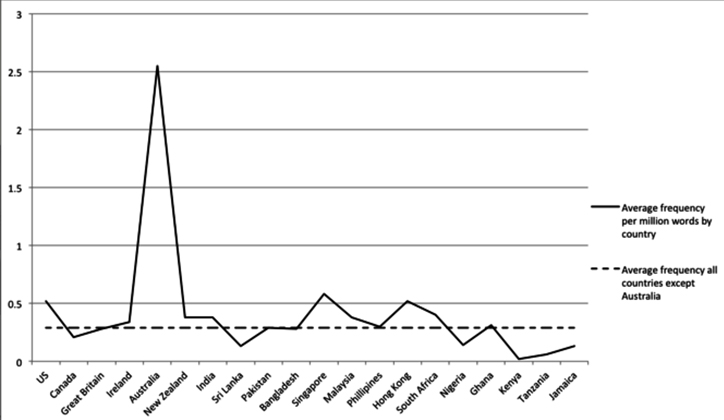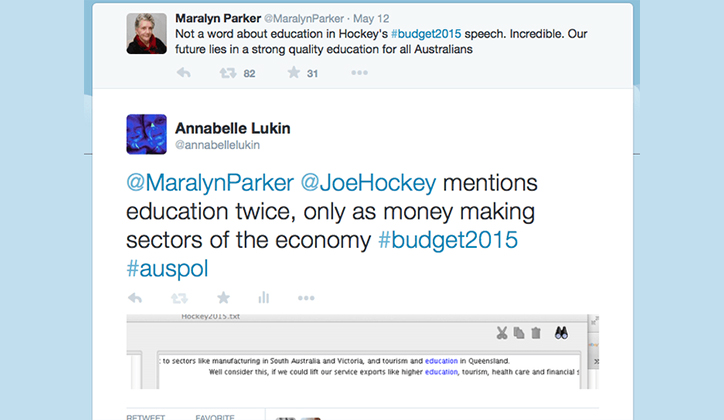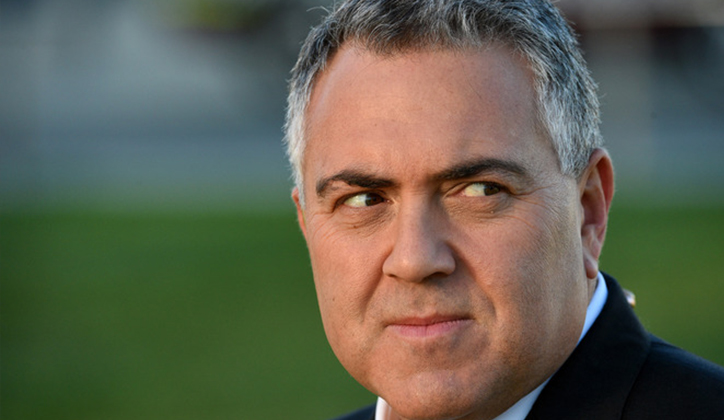This article was originally published by Annabelle Lukin on The Conversation, and shared as part of the Creative Commons.
Call me old-fashioned, but if there’s one phrase I like to hear in a federal budget speech it’s “GDP”. I don’t mind if it’s the abbreviation, or the full monty: Gross Domestic Product.
Hockey is the first treasurer since at least 1981 not to use this crucial measure in an annual budget speech. He may well be the first Australian treasurer since GDP was invented in the 1940s not to need the expression in his speech; my collection of federal budget speeches only goes back to 1981, when John Howard was treasurer.
The budget speech should tell us about the economy
So how is it that Treasurer Hockey didn’t, anywhere in his speech, utter the term “GDP”? And should anyone care?
As Diane Coyle writes in her book, GDP: A Brief but Affectionate History, GDP is “a made-up entity”, which is “artificial, complicated, and abstract”.
But it has also become the standard way we “measure or compare how well or badly countries are doing”. GDP indicates, however imperfectly, “innovation and human possibility”.
Its absence in a federal budget speech is telling, if not alarming. Hockey’s two budget speeches so far have lacked something that all his predecessors, however partisan, have deemed an essential part of the budget speech: a distinct statement of economic outlook or forecast.
Typically a forecast, based on Treasury advice, would set out the rate of growth of our GDP, the best guess about what was going to happen to rates of inflation and unemployment, predictions about our terms of trade, and so on.
Hockey’s speech made only vague and disparate references to the standard measures of the health of the economy. Last year’s speech (which mentioned GDP once, but only to boast about a rise in defence spending) was even thinner with respect to these key measures.
Last year I wrote that the absence of an economic forecast was a rhetorical lost opportunity for Hockey. By bypassing this standard ritual, I suggested he lost a certain gravitas that befits the role of federal treasurer. But this year I’ve taken umbrage.
I take politicians’ public rhetoric seriously. Rome’s greatest orator, Cicero, understood that rhetoric can be used for good or for ill. Which is precisely why political oratory must be examined and critiqued.
In the narratives around our annual budget, billions of our tax dollars are at stake, and theories and ideas about what the economy is and how it is best managed – and in whose interests – are made manifest.
Keynes versus Hayek, in rap.
A rhetorical reversal from the first budget
As the budget speech has become a more public performance, it increasingly tells “the Australian people” what the government thinks of us. And Hockey thinks we either don’t want, or don’t need, the cold hard facts of how we are travelling.
The absence of the traditional measures of economic performance, as complex and flawed as they are, set Hockey free for the complete rhetorical reversal from his first budget speech.
In 2014, Hockey recycled the “debt and deficit” meme, so loved by the Coalition that Ross Gittens gave it the patronym “Costelloism”, and defined it as the belief that all public debt is bad.
As I found in a study of the budget speeches of the two previous treasurers, for 12 years Costello was totally singular, and relentlessly partisan, in his budget rhetoric. Costello created our “surplus fetish”, seen in its glory in the Global Corpus of Web English, which sampled nearly 2 billion words of internet English from 20 different countries in December 2012. The frequency of “surplus” in our public discourse in Australia was off the chart by comparison to the other 19 countries sampled.

This surplus fetish had practical consequences. In Gittens’ view, it created an infrastructure deficit.
Rhetorically, Costello could do as he pleased. As Professor Alan Fenna has argued, the Howard government enjoyed “almost ideal conditions for governing that no party in power has experienced for decades”.
But if good economic management requires more than cooling your heels while the money rolls in, it became much more difficult in Swan’s time, and the task of selling the budget enormously more complex. Labor let the surplus bandwagon roll over it.
Late in Swan’s period as treasurer he found his voice. And it is to his great credit that his speeches were far less partisan than either Costello’s or Paul Keating’s. In his budget speeches, he did not once blame his predecessors for any of the problems he faced.
Swan tried to balance direct and frank discussion of the state of the economy, with the need to maintain confidence and optimism. In opposition, the Coalition was unrelenting in its attacks on him.
Words – and issues – missing in action
Now Hockey is in the chair. And his 2015 speech has another innovation: he is the first treasurer to directly address “the Australian people”. He is not the first to say “you” – Costello was first to use the second person pronoun. But Hockey is the first to use it to address “the people” collectively.
There were other words and phrases I would have liked to hear Hockey say on budget night 2015.
It would have been great to hear him say “mental health”. If he had, it would have been only the sixth time in 35 years that this expression had turned up in a budget speech. Ralph Willis used it first, in 1994. Peter Costello said it in three speeches (2000, 2001 and 2006) and Wayne Swan in two of his speeches (2011 and 2013).

And, with the growing awareness of how many women and children are killed each year by their partners and fathers, it’s more than a great pity that Hockey didn’t think to include some reference to the scourge of domestic violence.
He would have been only the second treasurer since 1981 (quite possibly, the second ever) to raise this issue in a budget speech. Costello was the first.
Both mental health and domestic violence are surely a drag on the economy, even if you don’t care to consider their social costs – though it is not so unusual that the treasurer didn’t mention them. It seems we are going to need an even more concerted campaign to make mental health and family violence part of our national story about where we are, and where we are going.
There are no rules for how one should give a budget speech: it is only by dint of collective expectation that a genre of this kind takes shape. We need to collectively raise our expectations of the annual budget speech.
Big reforms and difficult problems require courageous public conversations. That is why Hockey’s abrupt shift in rhetoric from one budget to the next is worrying.
Catch up on recent contributions to The Conversation from other Macquarie authors.

